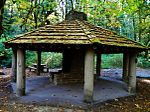Elwha Ranger Station

The Elwha Ranger Station is a historic district in Olympic National Park, originally built in the 1930s for the U.S. Forest Service. The complex of fourteen buildings is divided in two by Olympic Hotsprings Road. To the east lie the ranger station and three residences, with nine maintenance buildings on the west side of the road. The complex was turned over to the National Park Service in 1940 when the land was added to Olympic National Park from Olympic National Forest. Construction is typical of USFS practice, and reflects the Forest Service's preference of the time for bungalow and American Craftsman style architecture.The Elwha area was designated as one of fifteen areas in Olympic National Forest to be used for public recreation. The "Cleator Plan," named after Forest Service recreation engineer Fred W. Cleator, envisioned the construction of appropriate structures to support these activities, including a ranger station. In the mid-1930s a Civilian Conservation Corps camp was established nearby, contributing labor for forest construction projects. When the area was taken over by the National Park Service in 1940 the complex continued in use virtually unchanged, retaining its Forest Service character.
Excerpt from the Wikipedia article Elwha Ranger Station (License: CC BY-SA 3.0, Authors, Images).Elwha Ranger Station
Olympic Hot Springs Road,
Geographical coordinates (GPS) Address Nearby Places Show on map
Geographical coordinates (GPS)
| Latitude | Longitude |
|---|---|
| N 48.01651 ° | E -123.59048 ° |
Address
Olympic Hot Springs Road 3959
98363
Washington, United States
Open on Google Maps








